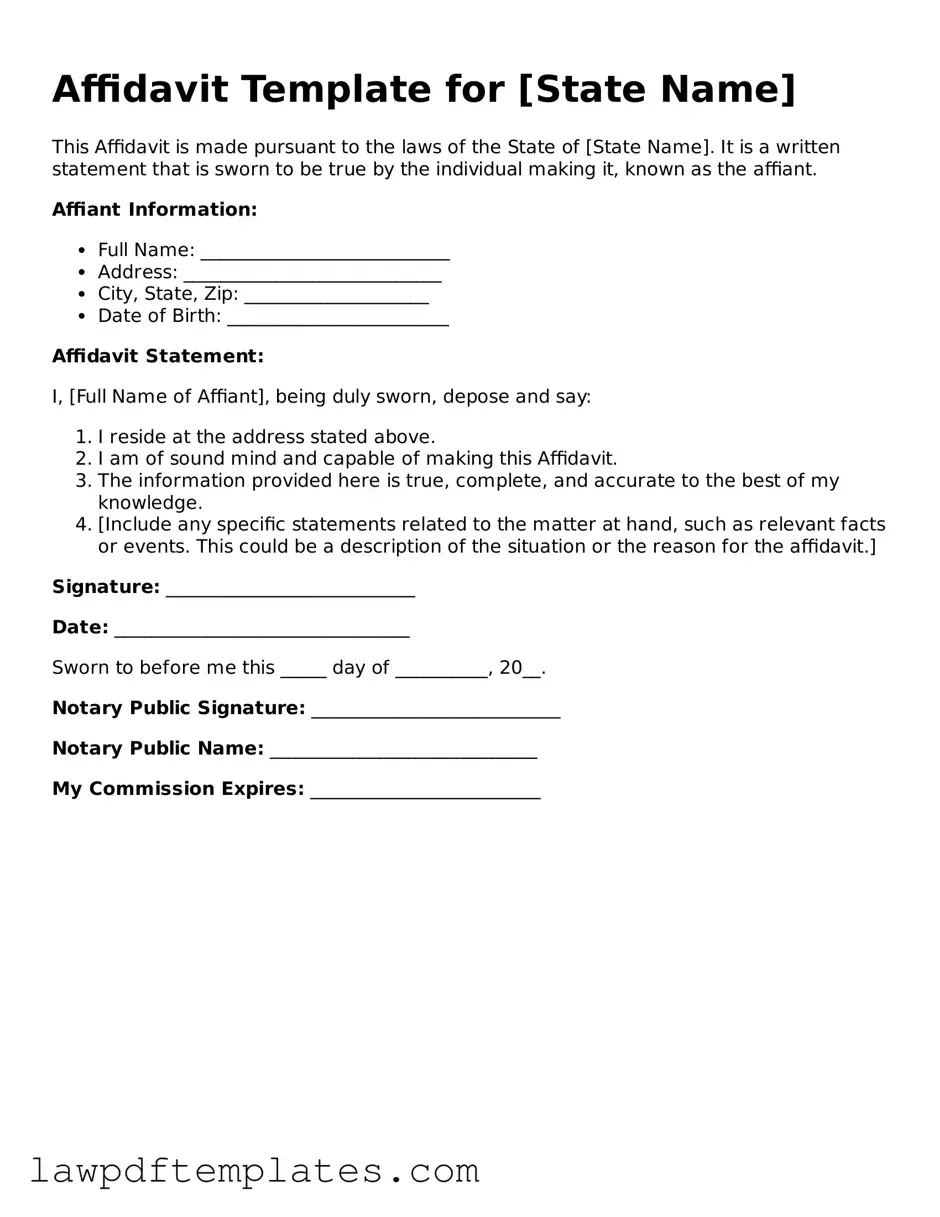Attorney-Approved Affidavit Document
Form Breakdown
| Fact Name | Details |
|---|---|
| Definition | An affidavit is a written statement made under oath, used as evidence in court. |
| Purpose | Affidavits are often used to support a motion, provide testimony, or verify facts. |
| Signature Requirement | The person making the affidavit must sign it in the presence of a notary public. |
| State-Specific Forms | Each state may have its own specific affidavit forms. For example, California uses the California Code of Civil Procedure. |
| Content | An affidavit typically includes the affiant's personal information, a statement of facts, and the affiant's signature. |
| Governing Law | In New York, affidavits are governed by the New York Civil Practice Law and Rules. |
| Notarization | Notarization is essential for the affidavit to be considered valid and legally binding. |
| Use in Court | Affidavits can be submitted as evidence in court cases, but they must comply with local rules. |
Sample - Affidavit Form
Affidavit Template for [State Name]
This Affidavit is made pursuant to the laws of the State of [State Name]. It is a written statement that is sworn to be true by the individual making it, known as the affiant.
Affiant Information:
- Full Name: ___________________________
- Address: ____________________________
- City, State, Zip: ____________________
- Date of Birth: ________________________
Affidavit Statement:
I, [Full Name of Affiant], being duly sworn, depose and say:
- I reside at the address stated above.
- I am of sound mind and capable of making this Affidavit.
- The information provided here is true, complete, and accurate to the best of my knowledge.
- [Include any specific statements related to the matter at hand, such as relevant facts or events. This could be a description of the situation or the reason for the affidavit.]
Signature: ___________________________
Date: ________________________________
Sworn to before me this _____ day of __________, 20__.
Notary Public Signature: ___________________________
Notary Public Name: _____________________________
My Commission Expires: _________________________
Common mistakes
Filling out an Affidavit form can be a straightforward process, but many individuals make common mistakes that can lead to complications. One frequent error is failing to provide accurate personal information. It is essential to include your full name, address, and other identifying details. Omitting or misrepresenting this information can create confusion and may even invalidate the document.
Another mistake often seen is neglecting to sign the affidavit in front of a notary public. A signature without notarization renders the affidavit ineffective. Notaries serve as impartial witnesses to the signing process, ensuring the document's authenticity. Always check that the notary's seal is present and that the signature is dated appropriately.
People sometimes overlook the importance of clarity and specificity in their statements. Vague language can lead to misunderstandings about the affidavit's intent. It is crucial to be clear and concise, detailing the facts and circumstances surrounding the affidavit. This clarity helps ensure that the document serves its intended purpose.
Additionally, individuals may forget to review the affidavit for errors before submission. Typos or incorrect information can lead to delays or even rejection. Taking the time to proofread your affidavit can save you from unnecessary complications. Consider asking someone else to review it as well; a fresh set of eyes can catch mistakes you might have missed.
Finally, failing to provide supporting documentation is a common oversight. Depending on the purpose of the affidavit, additional evidence may be required to substantiate your claims. Ensure that all necessary attachments are included and clearly labeled. This completeness will strengthen your affidavit and enhance its credibility.
Popular Templates:
Broward Animal Control - Helps protect both pets and the community from rabies outbreaks.
To assist you further in completing the USCIS I-864 form accurately, consider exploring resources available at PDF Documents Hub, which can provide valuable insights and guidance throughout the application process.
Printable Trailer Bill of Sale Pdf - A Trailer Bill of Sale is a document used for the sale of a trailer between two parties.
Certificate of Membership Template - Help streamline tax reporting related to membership interests and transfers.
